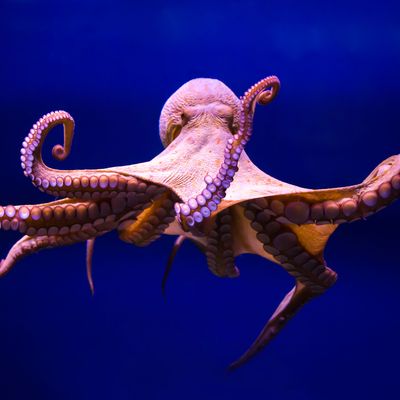
Convergent evolution is what happens when nature takes different courses from different starting points to arrive at similar results. Consider bats, birds, and butterflies developing wings; sharks and dolphins finding fins; and echidnas and porcupines sporting spines. Or, if you want to annoy a traditionalist scientist, talk about humans and octopuses — and how they may both have consciousness.
This is the thrust of Other Minds: The Octopus, the Sea, and the Deep Origins of Consciousness, a new book by the scuba-diving, biology-specializing philosopher Peter Godfrey-Smith, originally of Australia and now a distinguished professor at the City University of New York’s graduate center. The book was written up by Olivia Judson in The Atlantic, and you should read the whole thing, but what I find mesmerizing is how categorically other the eight-tentacled ink-squirters are, and how their very nature challenges our conceptualizations of intelligence.
“If we can make contact with cephalopods as sentient beings, it is not because of a shared history, not because of kinship, but because evolution built minds twice over,” Godfrey-Smith is quoted as saying. “This is probably the closest we will come to meeting an intelligent alien.” (He’s not the first to think so: The Hawaiian creation myth holds that octopuses are the only creatures left over from an earlier incarnation of the Earth, making them more proto-terrestrials than extraterrestrials.)
In evolutionary terms, humans and octopuses share an ancestor that lived in the ballpark of 600 million years ago: squirmy, ocean-dwelling little worms. (Unflattering, no?) Since our parting, octopuses have converged upon their own version of eyes; like apes, they are dexterous, able to manipulate things in the world; and as any diver or snorkeler who has encountered one will tell you, they’re super inquisitive, like humanity’s beloved companions — dogs, cats, goats. They also have 500 million neurons, Judson notes, equal to a marmoset, with more than half distributed though their tentacles. In an odd bit of symmetry, humans have the same number of neurons in their gut.
It’s the otherness of the octopus that makes it so hard to assess whether it has a mind or intelligence or consciousness or any of those heavy, brainy words. Why would tasks that measure human cognition be relevant for cephalopod thinking? It doesn’t help that octopuses are unruly experiment participants, known to destroy equipment and squirt researchers. If that’s not a sign of intelligence, what is? How could we capture the movement of an octopus’s mind if, as Godfrey-Smith has argued and it’s suggested by the neuron-in-the-arm thing, it’s much less centralized than the human experience — each tentacle may have a “mind” of its own? Because of the vastly different evolutionary histories, and the environment the animal has had to find fitness in, octopus intelligence is likely structured in a very different way from a human’s. “They really are an isolated outpost among invertebrates,” Godfrey-Smith told the Harvard Gazette. “From the point of view of the philosophy of the mind, they are a big deal.” And in trying to assess their intelligence, science is likely going to have to re-frame its understanding of human smarts, too.




